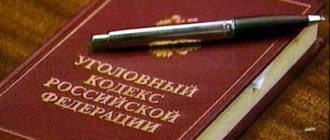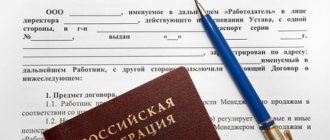Destruction or damage to someone else's property on a large scale, committed through careless handling of fire or other sources of increased danger, is punishable by a fine in the amount of up to one hundred and twenty thousand rubles or in the amount of the wages or other income of the convicted person for a period of up to one year, or by compulsory labor. a term of up to four hundred eighty hours, or correctional labor for a term of up to two years, or restriction of freedom for a term of up to one year, or forced labor for a term of up to one year, or imprisonment for the same term.
What rules for payment for business trips does Article 168 of the Labor Code of the Russian Federation contain?
Article 168 of the Labor Code of the Russian Federation declares the employer’s obligation to compensate the employee for expenses associated with a business trip:
- along the road in both directions;
- for renting housing;
- additional, arising due to being away from the place of permanent residence (daily allowance);
- others, which may include expenses for travel at the place of business travel, baggage transportation, and postage.
Despite the fact that the general rules for sending on a business trip are regulated at the state level (Article 166 of the Labor Code of the Russian Federation, Decree of the Government of the Russian Federation dated October 13, 2008 No. 749), the legislator leaves the establishment of a certain procedure, content of expenses and specific amounts of compensation for each position at the discretion of the employer.
How does the payment procedure for travel allowances depend on the type of employer?
Text of Art. 168 of the Labor Code of the Russian Federation, depending on the form in which the employer exists, provides 3 options for establishing the payment procedure and the amount of travel expenses:
- in accordance with the standards established by Government resolutions - for state organizations of federal significance;
- according to the standards developed at the level of constituent entities of the Russian Federation - for state and municipal organizations of regional significance;
- in the manner established by internal regulations - for employers of all other forms.
For the first option, the following decrees of the Government of the Russian Federation apply:
- dated 10/12/2013 No. 916 - regarding the procedure for paying for business trips for employees of internal affairs bodies, the state fire service, institutions of the penal system, drug control authorities, customs authorities;
- dated 04.03.2013 No. 180 - concerning the procedure established for travel of lawyers engaged in teaching, scientific and examination activities;
- dated 02.10.2002 No. 729 - establishing expense standards for business trips within the territory of the Russian Federation;
- dated 02.08.2004 No. 64n - containing an indication of the maximum amount of payment for living expenses in foreign countries;
- dated December 26, 2005 No. 812 - establishing daily allowance standards for foreign business trips.
For employers who are not government organizations, the mandatory rules established by Decree of the Government of the Russian Federation dated October 13, 2008 No. 749, which clarify the following points related to business trips:
- definition of the concept of it in terms of place;
- counting deadlines, establishing days of departure and return;
- rules for calculating salaries during a business trip;
- general principles of payment for business trip expenses;
- principles of calculation and payment of daily allowances for business trips abroad.
The employer does the details of these rules and regulations for payment of expenses independently. Moreover, the approach to this issue can be very different. For example, the amount of compensation can be detailed depending on:
- from employee positions.
- travel regions.
- length of time spent on the road or on a business trip.
For more information on drawing up an internal document regulating the rules related to business trips, read the article “Regulations on business trips - sample 2017” .
The structure of the offense under Art. 168 of the Criminal Code of the Russian Federation
Any crime has a clear structure. It is associated with the presence of elements that constitute a crime. Offense under Art. 168 has the following structure:
1) an object is a relationship that can be classified as “property”. That is, the property must be registered as ownership.
2) the subject of the crime must be the property of other persons. This property can be either movable or immovable. Moreover, this property must cost more than 250 thousand rubles, only then is it possible to attract it under this article.
3) the very actions of damaging (destructing) the property of other persons due to careless handling of fire form the objective side of Art. 168. Also under this article, careless handling of other sources of increased danger, which resulted in a fire of someone else’s property, is also possible. Careless handling of fire may include improper handling of gas burners, etc.
4) subject – sane citizens over 16 years of age
5) Intent to commit a crime under Art. 168 of the Criminal Code of the Russian Federation forms the subjective side of the crime under Art. 168. It can be either direct or indirect.
What is considered property within the meaning of the article in question?
These are objects of property that can be alienated in accordance with the procedure established by law and have characteristics established by law.
For more detailed information, please contact a criminal lawyer.
What documents are required for a business trip in 2017?
Since 2015, the following documents have ceased to be mandatory for use (subparagraph “e”, paragraph 2 of the Government of the Russian Federation of December 29, 2014 No. 1595):
- travel certificate;
- official assignment;
- trip report.
As a result, the main ones turned out to be (Resolution of the Government of the Russian Federation dated October 13, 2008 No. 749):
- the employer’s order to send him on a business trip, drawn up in writing (clause 3);
- an advance report on the trip, confirming not only the expenses, but also the actual duration of stay (clause 7, clause 26).
Confirmation of dates is not a problem with dated travel documents, although they may allow for adjustments to take into account the time required to reach the departure or arrival point of the main vehicle outside the populated area.
For cases of lack of travel documents, clause 7 of the Decree of the Government of the Russian Federation dated October 13, 2008 No. 749 provides 2 more options for confirming dates:
- By dates of documents of residence. Departure and arrival dates in this situation can be justified by a memo explaining the method of travel to and from the business trip location.
- In the absence of residence documents, it is possible to accept a memo referring to other confirmations of dates to justify the dates. The most reliable document in this situation will be the one issued by the receiving party.
With what comments is the opportunity to travel by private transport used?
With the permission of the employer, it is possible to travel on a business trip using transport, the use of which will not provide a travel document of the established form with the appropriate dates. This can happen when using:
- company car;
- personal transport (this possibility is confirmed by letter of the Federal Tax Service dated November 24, 2015 No. SD-4-3/20427);
- transport of third parties (by proxy or when traveling as a passenger).
The reality of such a trip and its actual dates can be confirmed:
- waybill issued for the corresponding vehicle;
- payment documents for expenses incurred en route; the dates and names of settlements in them must coincide with the time period and route;
- a certificate from the receiving party regarding the dates of arrival and departure.
These documents must necessarily accompany a memo explaining the method of travel to and from the business trip. Without them, this note cannot become a proper supporting document (letter of the Ministry of Finance of the Russian Federation dated April 20, 2015 No. 03-03-06/22368).
Read more about the preparation of such a note in the material “Official memo for a business trip - sample 2017” .
Unintentional damage to property
Unintentional damage to someone else's property means causing harm to someone else's property that has material value and expression, without direct intent for such an outcome.
When is liability provided?
Punishments against the offender are applied when the unlawful act committed meets two conditions:
- The amount of damage caused as a result of careless actions by the guilty person exceeds the mark established in the Criminal Code for large damage of 250,000 rubles;
- Damage to property was caused by careless handling of fire or other sources of increased danger.
Criminal liability
Criminal actions that caused unintentional damage to property entail holding the guilty person accountable under the Criminal Code.
However, the application of punishment against the offender is possible only in cases where the damage caused by his actions is considered major. The offender faces one of the following penalties:
- Fine of up to 120,000 rubles;
- Performing mandatory work for up to 480 hours;
- Carrying out correctional work, the maximum duration of which should not exceed 2 years;
- Restriction of freedom. The maximum sentence is 1 year;
- Carrying out forced labor for up to 1 year;
- Imprisonment for up to 1 year.
When property damage does not fall under the Criminal Code
Bringing the guilty person to justice is possible only in cases where major damage has occurred as a result of unintentional damage or complete destruction of property. Accordingly, if the value of the lost property is below this level, bringing the guilty person to criminal liability is not allowed.
What unusual situations may accompany a business trip?
Situations not covered by official documents are common for business trips, for example:
- The employee did not complete the task for which he was sent on a business trip. All expenses related to it are nevertheless subject to payment in full (decision of the St. Petersburg City Court dated March 13, 2012 No. 33-3718/2012).
- An employee on a business trip worked overtime or at night. He should be paid for his work at an increased rate (letter from the Ministry of Labor of Russia dated November 14, 2013 No. 14-2-195).
- The employee was not given an advance payment for business trip expenses, and he refused to go. This will not be considered a disciplinary offense, giving the employer the opportunity to punish the employee (appeal ruling of the court of the Yamalo-Nenets Autonomous District dated July 25, 2013 in case No. 33-1595/2013).
- An employee leaving on a business trip abroad is given an advance payment partly in foreign currency and partly in rubles. This option does not contradict the current rules, but must be enshrined in an internal regulatory act and carried out in compliance with currency legislation. It will also not be a violation to issue to the employee in foreign currency the amount of overexpenditure on a foreign business trip.
- An employer who is not a state organization determines the daily allowance in a smaller amount than the amount provided for by Decree of the Government of the Russian Federation dated October 2, 2002 No. 729 (100 rubles). This is possible, since the employer of this form of daily allowance needs to enter independently, and the law does not establish their minimum permissible amount. However, in this case, the employee may consider himself to have been discriminated against (Article 3 of the Labor Code of the Russian Federation) and go to court.
Thus, for an employee sent on a business trip, the norms of labor law remain effective, and cases of a controversial nature do not deprive him of the opportunity to receive the guaranteed articles.
167 of the Labor Code of the Russian Federation, average earnings and reimbursement of business trip expenses. You can find more complete information on the topic in ConsultantPlus. Free trial access to the system for 2 days.
Article 168. Destruction or damage to property due to negligence
Appeal ruling of the Judicial Collegium for Criminal Cases of the Supreme Court of the Russian Federation dated June 28, 2018 N 69-APU18-3 In the appeal, lawyer Asadova N.R. in the interests of the convicted Snurnitsyn G.I. expresses disagreement with the conclusions of the court, which in her opinion are based on assumptions, with the court’s assessment of the testimony of Snurnitsyn, who explained his actions with the intention to imitate a fire and scare R. into forcing her to refuse a trip to her husband, in the absence of Snurnitsyn’s goal to take her life; cites in the complaint the testimony of witnesses about the relationship between Snurnitsyn and R. and other evidence, gives them his own analysis and assessment, expresses disagreement with the assessment of the evidence given by the court, with the court’s decision to refuse to exclude evidence obtained in violation of the Code of Criminal Procedure of the Russian Federation, sets out to the court his own version the motive for the crime committed; refers to Snurnitsyn’s misconception regarding the number of people present in the house at the time of the arson, to the fact that he made an anonymous report about the fire, questions the admissibility of Snurnitsyn’s testimony at the preliminary investigation, and asks for reclassification of Snurnitsyn’s actions under Part 3 of Art. 109 and art. 168 or part 2 of Art. 167 of the Criminal Code of the Russian Federation, challenges the punishment, since the court did not take into account that Snurnitsyn anonymously called the fire brigade, sees grounds for applying Art. of the Criminal Code of the Russian Federation, expresses disagreement with the decision to collect moral damages, questions the moral suffering of the victim, and asks for the sentence to be changed or cancelled.
Appeal ruling of the Judicial Collegium for Criminal Cases of the Supreme Court of the Russian Federation dated February 26, 2019 No. 5-APU19-6
considered in open court the material on the appeal of Razhabov A.O. to the resolution of the Moscow City Court dated December 21, 2022, by which the resolution of the Deputy Prosecutor General of the Russian Federation dated November 22, 2022 on extradition to law enforcement agencies of the Republic of Uzbekistan for criminal prosecution under Part 1 of Art. 168 of the Criminal Code of the Republic of Uzbekistan
Appeal ruling of the Judicial Collegium for Criminal Cases of the Supreme Court of the Russian Federation dated February 27, 2019 N 48-APU19-2
to the competent authorities of the Kyrgyz Republic to bring to criminal liability for robbery under clause 2, part 3, clause 3, part 4 of Art. 168 of the Criminal Code of the Kyrgyz Republic. After hearing the report of Judge Zatelepin O.K. on the content of the appealed court decision, the substance of the appeal, the speech of P.V. Korchagin, in respect of whom the decision to extradite was made, lawyer V.I. Galperina, prosecutor S.P. Terekhova, Judicial Collegium
Appeal ruling of the Judicial Collegium for Criminal Cases of the Supreme Court of the Russian Federation dated March 28, 2019 N 4-APU19-6
As follows from the presented materials, the law enforcement agencies of Uzbekistan are prosecuting Rasuleva for committing crimes under paragraph “a” of Part 3 of Art. 168, part 1 art. , 211 and paragraph “b”, part 2 of Art. 168 of the Criminal Code of the Republic of Uzbekistan and is accused of having, through deception and abuse of trust, seized S.’s property and funds on an especially large scale in the period from August 30, 2016 to October 2, 2016 in the Almazar district of Tashkent, the Republic of Uzbekistan, and on October 12 2016, acting repeatedly, through deception and abuse of trust, took possession of the property of victim A. causing her material damage in a significant amount.
Appeal ruling of the Judicial Collegium for Criminal Cases of the Supreme Court of the Russian Federation dated June 27, 2019 N 78-APU19-18
On February 6, 2022, the Deputy Prosecutor General of the Russian Federation issued a resolution on the extradition of I.S. Alimov. competent authorities of the Republic of Uzbekistan for criminal prosecution under clause “b”, part 2 of art. 168 of the Criminal Code of the Republic of Uzbekistan. By the resolution of the St. Petersburg City Court dated April 15, 2022, the complaint of Alimov I.S. the said decision of the Deputy Prosecutor General of the Russian Federation was left without satisfaction.
Appeal ruling of the Judicial Collegium for Criminal Cases of the Supreme Court of the Russian Federation dated 08/01/2019 N 71-APU19-1
to the resolution of the Deputy Prosecutor General of the Russian Federation dated March 1, 2022 on her extradition to law enforcement agencies of the Republic of Uzbekistan for prosecution for fraud under clauses “b”, “c”, part 2 of Art. 168 of the Criminal Code of the Republic of Uzbekistan and production, forgery of official documents under clause “b”, part 2 of art. 228 of the Criminal Code of the Republic of Uzbekistan.
Appeal ruling of the Judicial Collegium for Criminal Cases of the Supreme Court of the Russian Federation dated July 16, 2019 N 5-APU19-57
by a resolution of the Deputy Prosecutor General of the Russian Federation dated April 5, 2022, the request of the Prosecutor General's Office of the Republic of Uzbekistan for the extradition of Fayazov to be prosecuted for committing a crime provided for in paragraph “b” of Part 2 of Art. 168 of the Criminal Code of the Republic of Uzbekistan, to the competent authorities of the Republic of Uzbekistan.
Appeal ruling of the Judicial Collegium for Criminal Cases of the Supreme Court of the Russian Federation dated April 11, 2019 No. 5-APU19-31
law enforcement agencies of the Republic of Uzbekistan to bring to criminal liability for committing a crime under paragraph “a” of Part 3 of Art. 168 of the Criminal Code of the Republic of Uzbekistan. After hearing the report of Judge Zatelepin O.K. on the content of the appealed court decision, the substance of the appeal, the speech of M.M. Mirolimov. coals, in respect of whom the decision to extradite was made, lawyer S.V. Romanov, prosecutor N.V. Savinov, Judicial Collegium
Appeal ruling of the Judicial Collegium for Criminal Cases of the Supreme Court of the Russian Federation dated July 6, 2017 N 10-APU17-6
In the appeals and additions to them, the convicted Zherikhina O.A. and lawyer Litvinov V.P. in her defense they express disagreement with the verdict, due to the discrepancy between the court's conclusions and the actual circumstances of the case. Analyzing the evidence in the case, including the testimony of witnesses, the testimony of Zherikhina herself at the court hearing, they claim that there was no intent to set fire to R.’s apartment and that the fire was accidentally caused by an unextinguished match. The lawyer draws attention to the fact that Zherikhina took measures to warn the victim about the fire, therefore, her actions can only be regarded as careless, under Art. 168 of the Criminal Code of the Russian Federation, but due to the insignificance of the damage, there is no corpus delicti in her actions. In addition, the court did not give a proper assessment to the testimony of the convict about her causing bodily harm to V. in the process of necessary defense, who had previously beaten her mother, D., and was aggressive. The court did not take into account Zherikhina’s testimony that she did not strike V. with a knife, but struck them at the level of the victim’s ear, into the pillow. It is also impossible to exclude a slander on the part of witness K. The author of the complaint also draws attention to the fact that no biological traces belonging to V. were found on Zherikhina’s clothes; the convict refused the testimony given during the investigation.
Appeal ruling of the Judicial Collegium for Criminal Cases of the Supreme Court of the Russian Federation dated November 30, 2017 N 50-APU17-14
He asks that he be acquitted in terms of murder, and that in terms of destruction and damage to the property of the victims, the actions be qualified under Art. 168 of the Criminal Code of the Russian Federation. In objections to the appeal, state prosecutor Mityakin V.V. notes that the verdict is legal, reasonable and fair, there are no grounds for its cancellation or change.
Appeal ruling of the Judicial Collegium for Criminal Cases of the Supreme Court of the Russian Federation dated 04/05/2018 N 38-APU18-1
In additions to the complaint, he asks to change the sentence, to reclassify his actions under Part 3 of Art. 109, part 1 art. 118, art. 168, part 1 art. 139 of the Criminal Code of the Russian Federation, sentencing him under these articles; - lawyer Yakovlev E.I. in the interests of the convicted Trofimov, considers the sentence illegal, unfounded and unfair. In his opinion, the court’s conclusions do not correspond to the actual circumstances of the case, and the verdict is based on assumptions; Trofimov’s arguments that the fire started due to negligence, Trofimov’s lack of intent to kill the victims have not been refuted, and his guilt has not been proven. He asks to change the sentence, to reclassify Trofimov’s actions under Part 3 of Art. 109, part 1 art. 118, art. 168, part 1 art. 139 of the Criminal Code of the Russian Federation, imposing a punishment on him within the limits of the sanctions of these articles.







